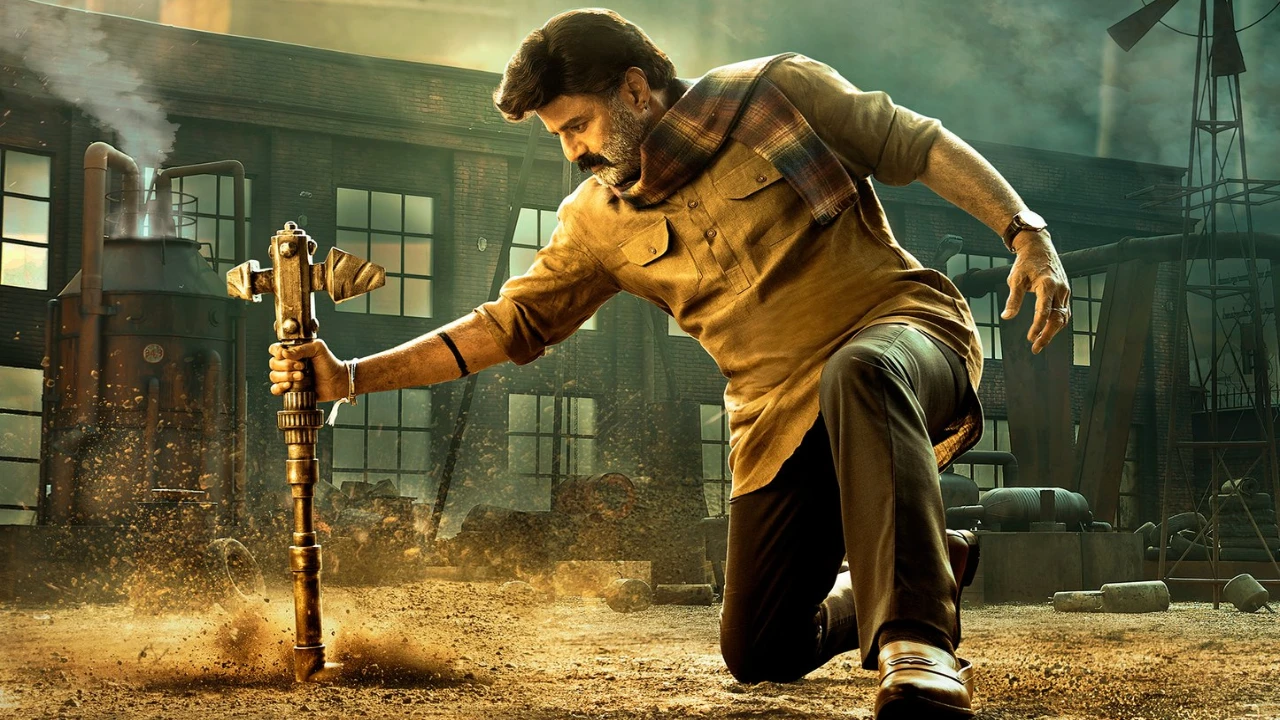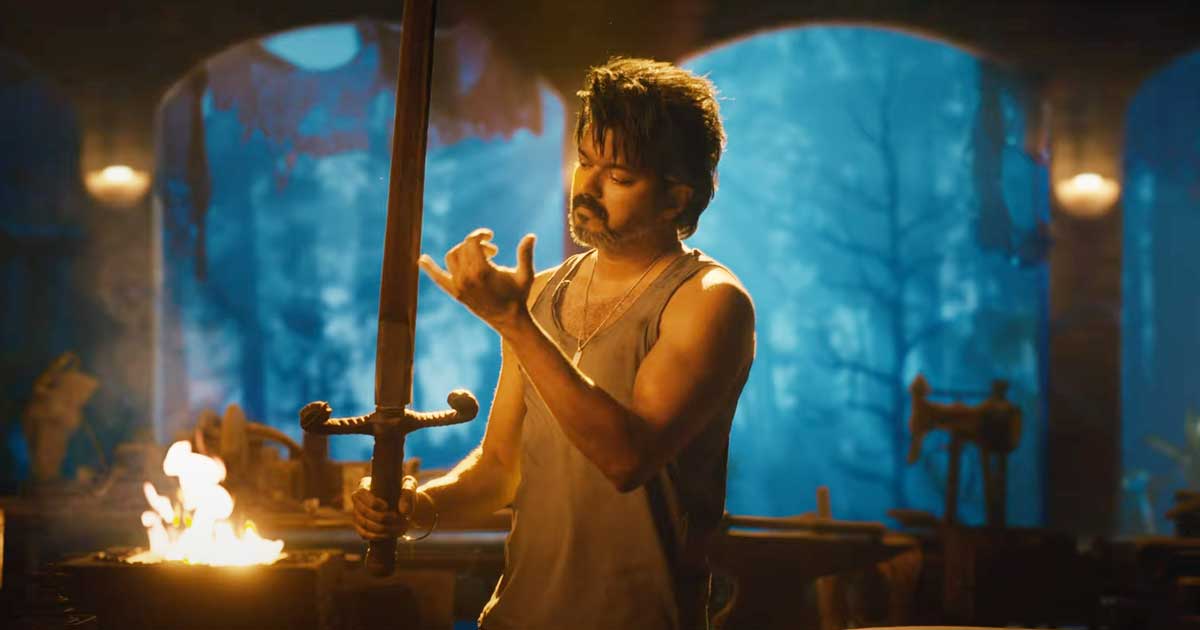Telugu Movie Review: Bhagavanth Kesari is just too formulaic to be redeemed by an engaging relationship between likable leads

At the heart of Bhagavanth Kesari is a tender relationship that really works. The title character, played by Balakrishna, is an adoptive father to Vijayalakshmi “Viji” (played by Sreeleela), the blood daughter of the deceased jailer who set him free. As Viji enters young adulthood, her bond with Bhagavanth – the man who has raised her for over a decade to be strong and independent – remains tighter than most between parents and children her age. But they are distanced by a longstanding disagreement: Bhagavanth wants Viji to enter the Army – something her late father requested, inspired by her late mother – but Viji’s past traumas won’t let her go down that road. Racked with anxiety, she feels that marrying her boyfriend, Karthik (Rahul Ravi), may be the better path. Bhagavanth has other plans.
If it seems like this dynamic is setting the stage for some broad, preachy themes of female empowerment, you’d be correct. Bhagavanth Kesari definitely spares no opportunity to convince the viewer of its feminist credentials, while not offering much of anything new in this department. But even in spite of the rather exaggerated nature of this messaging, both the humorous rapport and emotional moments between Bhagavanth and Viji ring true to a real father-daughter relationship, warts and all. Credit must go to both actors in developing this makeshift familial bond with seeming effortlessness: Balakrishna (widely commended for playing a character his age here) and Sreeleela feel unforced and natural together, both in terms of the love between their characters and their rift about Viji’s future.
Tamil Movie Review: Leo is an exhilarating action-crime-mystery, even in spite of a second half that doesn’t fully deliver

If you had asked me one year ago to compile a list of 100 American movies made in the last twenty years that would make good candidates to be reimagined by Tamil filmmakers, I doubt I ever would have come up with David Cronenberg’s A History of Violence. And yet, as envisioned by Lokesh Kanagaraj – in the third chapter of his larger “LCU” or “Lokesh Cinematic Universe,” no less – the inspiration feels entirely logical and natural. In fact, if there’s a quibble to be had with Leo, it’s that it feels a little too safe and familiar for a Kollywood smash-hit, not that its imagination is too large. For a movie that actively announces itself as a “tribute” to A History of Violence in its opening titles, Leo never really tries to mimic Cronenberg’s penchant for psychological boundary-pushing.
While the adaptation choice may strike some as peculiar given the film’s more modest ambitions, Leo does successfully take the basic setup of A History of Violence and mold it to fit a traditional Kollywood crime saga fronted by a protagonist with a suspicious past. Like Viggo Mortensen’s Tom Stall before him, Vijay’s Parthiban here becomes an accidental local celebrity in his small town after he successfully defends himself, his daughter, and his staff by gunning down a group of homicidal maniacs robbing his café after-hours. The attention proves entirely unwanted, however, when he becomes a target as a result. And the men who want him dead are not just those linked to the ones he killed. There is another, much larger, much scarier group who spot Parthiban in the news and feel confident they’ve finally found an ex-associate they’ve long been searching for named Leo Das. Given Parthiban’s stunning marksmanship during the self-defense incident, we have a feeling they might be right, despite his vehement denials.
Hindi Movie Review: Mission Raniganj takes a dated, but still emotionally engaging approach to telling a harrowing true mining story

The box office underperformance of Mission Raniganj has led many online and in the Bollywood media to speculate that Akshay Kumar may be ‘done for’ as a leading man, especially when paired with the disastrous results for his other key film this year, Selfiee. And the movie itself lends plenty of ammunition to this argument, coming across as dated in several ways that feel less nostalgic (a la Top Gun: Maverick) than they do just-plain-tired. Based on the famous coal mining rescue mission of 1989, the film’s story is truly remarkable, but as audiences have been reminded countless times before, inspiring source material doesn’t automatically lend itself to great filmmaking.
The first few scenes, in particular, had me fearing for the worst. They immediately struck me as though they could be part of a Bollywood film quickly forgotten 20 years ago – and I’m relatively new to watching this industry’s productions! Kumar’s character, mining engineer Jaswant Singh Gill, is introduced with such an old-fashioned heroic tone that feels so artificial, you have to keep reminding yourself that he’s actually based on a real person. Then there’s a throwaway musical number because… well, the filmmakers still feel obligated to include one and there was no other logical place to toss it in. Not long after, we get to the big action set-piece where the mine collapses, trapping dozens of miners inside, and the cheap-looking CGI (especially the water effects) undermines the authenticity of the chaos.
Telugu Movie Review: Rules Ranjann is an aggressively silly rom-com

I hung in with Rules Ranjann for longer than it deserved my goodwill. There is something so off-the-wall and silly about the movie’s presentation that an open viewer has no choice but to play along at first. Especially due to what appears to be a topical setting/subject matter – a naïve tech worker trying to navigate his way up the corporate latter – I figured it had to be aiming for exaggerated satire. Tired of abuse from his Hindi-speaking colleagues in Mumbai, Tirupati transplant Mano Ranjann (Kiran Abbavaram) makes a power-play to reign over the entire office – his boss (Annu Kapoor) included – as a sort of makeshift dictator. He’s the first in and the last out, and nothing will escape his watchful eye, leading him to be known as Rules Ranjann.
In what initially feels like an exaggerated allegory on today’s crumbling social standards in both the workplace and off-the-clock, Ranjann’s control-freak nature seeps outside his 9-to-5 and into his (uneventful) personal life. Mercifully, Tollywood’s penchant for original music and likely a lacking budget spare us the needle drop of Dua Lipa’s “New Rules” that would have been inevitable in a Hollywood version of this story. But there’s still plenty of the track’s salacious spirit on display. A questionable co-director of B-grade films (played by Vennela Kishore) moves in across the hall from Ranjann, bringing with him a new lay every night, undoubtedly luring them with the promise of a future starring role in one of his movies. Ranjann has no tolerance for this scandalous behavior, so he does what any aggrieved neighbor would do: finds a way to get his new hallmate kicked to the curb.

